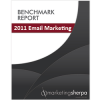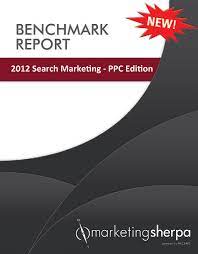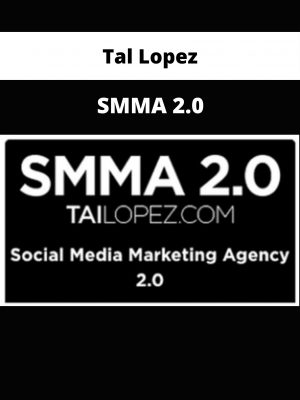MarketingSherpa – 2012 Search Marketing Benchmark Report: PPC Edition
$397 Original price was: $397.$59Current price is: $59.
Shopping Instructions:
- DISCOUNT 15% : SHOP15
- Product Delivery: Within 1 – 12 hours after purchase.
Download available within 1-2 hours. It also features a special section on landing page optimization with analysis and insight on topics critical to the future success of paid search marketing:
MarketingSherpa – 2012 Search Marketing Benchmark Report: PPC Edition
Extending PPC capabilities: Social, local and mobile search
Generating higher traffic (at least in the short term) has always been a PPC speciality. To help drive traffic, marketers with empty sales pipelines, limited-time offers, or seasonal promtions, continuly use PPC to push traffic or move the needle when demand is high.
However, what’s lacking from most paid search campaigns is the untapped area of opportunity found in social, local and mobile search tactics. For example, a recent survey of 1,530 B2B and B2C marketers found that only 48 percent of organizations enhance their basic listings with images or custom details – and only 20 percent of organizations have added videos to their listings. That’s a lot of lost opportunity missed.
By utilizing tactics such as Google Boost, location and phone ad extensions, mobile versions of web sites, images and videos. Marketers can now extend their reach to a different audience – and very specific type of user, giving searchers more of what they want, when they want it.
In the 2012 Search Marketing Benchmark Report – PPC Edition, you’ll find several new case studies (on what is and isn’t working) in real-life paid search marketing campaigns. This 177-page report helps you get more out of your paid search efforts – by aligning your top challenges to the most effective PPC tactics. Get answers to these questions:
-
- How can I use social, local and mobile paid search effectively?
- What can I do to improve my monitoring and tracking metrics?
- How can I find ways to increase your inbound marketing leads?
- What analytic tools are most widely used to optimize PPC performance?
- What insights do agencies have on improving quality scores?
PPC marketing insights from your peers
One of the key takeaways from the report are the PPC marketing insights from your peers. You’ll gain a better understanding of the top challenges and objectives from many different perspectives from measuring ROI, increasing web traffic, lead generation and more.
- “Our primary objective for PPC is traffic generation, and we focus as closely as possible on maintaining a low CPC. We live and die for the long tail.”
- “We use PPC to analyze traffic potential for SEO. We don’t use PPC as a marketing tool in itself.”
- “We create Ad Groups based on new products that we are releasing, as well as for category pages on our site.”
- “Test ROI and campaign messaging with Google AdWords before expanding to other PPC venues such as Bing, Shopzilla etc. We use PPC to measure the conversion success of targeted terms to product offerings and have specific ROI goals.”
- “Keyword research, then cost analysis, then landing page design/development…measure, measure, measure.”
More Key Questions Answered in this year’s study
- How do you create an effective highly-targeted ad group?
- What impact does split testing on landing pages have on your PPC campaigns?
- How can you use PPC analytics to capitalize on daily performance trends?
- How are marketers overcoming the PPC challenges hampering effectives over the last 12 months?
- How can I improve my lead quality with paid search?
- Are PPC budgets expected to stay the same or grow?
- How much does an inbound lead cost on average?
Get immediately download MarketingSherpa – 2012 Search Marketing Benchmark Report: PPC Edition
Search Marketing Success Stories: New PPC Tactics, strategies and Charts
The 2012 Search Marketing Benchmark Report-PPC Edition is more than just data. This report is a comprehensive reference guide containing more than 125 charts with analytical commentary, hundreds of informative insights from your peers, and more. It also features a special section on landing page optimization with analysis and insight on topics critical to the future success of paid search marketing:
- Learning from an unsuccessful PPC campaign
- Using PPC analytics to capitalize on daily performance trends
- Outsourcing PPC Campaigns increases conversions 400%
- Designing custom landing pages increases leads by 88%
- Improving conversions with landing page tests
- Using sitelinks to lift clickthrough rates 14%
- Redesigning PPC ads and landing page increases CTR
Key findings from the 2012 Search Marketing Benchmark Report – PPC includes:
- The alignment of paid search marketing objectives against the most difficult challenges
- The usage, effectiveness and level of effort required for PPC tactics
- How organizations are allocating marketing dollars and where they are shifting their efforts
- What marketers are doing to prosper in local and mobile PPC
- Most effective advertising networks and ad formats
- How agencies contribute to their clients’ PPC marketing efforts
What Others Have Said about MarketingSherpa’s Search Marketing Benchmark Reports?
“MarketingSherpa has done it again with their 2011 Search Marketing Benchmark Report – SEO Edition. With the help of Lead Author, Research Analyst Jen Doyle, they’ve put together an excellent resource for marketers looking for strategic guidance as well as real data about search engine marketing.”
-Lee Odden, TopRank Online Marketing
“Once again, MarketingSherpa delivers THE definitive benchmark to all things search. But this time they’ve taken it to a completely new level, the SEO edition provides tactical insights, analysis and commentary from industry insiders that allow you to take the actions needed to remain competitive. I can’t wait to review the upcoming PPC version as well.”
-Jim Kukral, author of the book “Attention! This Book Will Make You Money”
2012 Search Marketing Benchmark Report – PPC Edition Summary Table of Contents:
- Chapter 1: PPC Objectives and Challenges(pg.9-26)
- Informal processes still define PPC marketing maturity
- Challenges hampering PPC effectiveness over last 12 months
- Objectives for PPC programs in next 12 months
- Marketer insights on developing PPC marketing strategies
- Chapter 2: PPC Tactics (pg.27-48)
- Majority of organizations run PPC campaigns in-house
- Creating highly-targeted ad groups is the most popular tactic
- Split testing landing pages considered to be the most difficult
- Split testing landing pages may be difficult, but it is very effective
- Marketer insights on success with PPC tactics
- Chapter 3: Monitoring and Tracking Metrics (pg.49-70)
- Web conversion often defined as multiple-field form completion
- Many marketers have no read on how many bad clicks they get
- Small percentage of organizations have better than average quality scores
- Nearly 40% of organizations bid on less than 100 key terms
- Exact match is the most popular match type
- Paid search plays average role in total traffic volumes
- Median web conversion rate on paid search traffic is nearly 4%
- Paid search accounts for nearly one third of total leads on average
- Paid search yields mixed results for lead quality, with some standouts
- Free analytics solutions are the most widely used
- Marketer insights on using analytics to optimize PPC performance
- Chapter 4: Planning and Tracking Budgets (pg.71-100)
- Biggest budget increases expected in inbound marketing
- Half of marketing budgets go to online marketing, on average
- PPC and website take biggest shares of online marketing budget
- Majority of PPC budget goes towards clicks
- Similarly-sized organizations display wide variability in PPC operating budgets
- Chart: Current PPC budgets, by organization size
- PPC budgets expected to stay the same or grow
- Marketer insights on the value returned from PPC budget invested
- Chapter 5: Inbound Marketing Leads (pg.101-106)
- Inbound marketing lead sources are growing in importance
- Inbound leads cost 66% less than outbound leads, on average
- Chapter 6: Using PPC in Local Search (pg.107-122)
- Local search viewed as having positive impact on objectives
- Many still have no local business listing on search engines
- Google Boost lags in usage
- Marketer insights on the challenges of optimizing for local search
- Marketer insights on successfully optimizing for local search
- Chapter 7: When Paid Search Goes Mobile (pg.123-132)
- Mobile search viewed as having positive impact on objectives
- Less than half of organizations enable ads to show on mobile devices
- Marketer insights on their challenges with mobile search
- Marketer insights on their successes with mobile search
- Chapter 8: Search Marketing Success Stories (pg.133-140)
- Case Briefing: Learning from an unsuccessful PPC campaign
- Case Briefing: Using PPC analytics to capitalize on daily performance trends
- Case Briefing: Outsourcing PPC Campaigns increases conversions 400%
- Case Briefing: Designing custom landing pages increases leads by 88%
- Case Briefing: Improving conversions with landing page tests
- Case Briefing: Using sitelinks to lift clickthrough rates 14%
- Case Briefing: Redesigning PPC ads and landing page increases CTR 54%
- Chapter 9: Agency Perspectives (pg.141-152)
- Client investment in PPC is driven by measurable ROI
- Agencies are more optimistic when it comes to PPC budget increases
- Relevant ad copy and highly targeted keywords considered most effective
- 30 % of client campaigns have quality scores greater than 7
- Agency insights on improving quality scores
- Text ads outperform other ad formats by a factor of 3
- Ads on social media sites growing in their effectiveness
- Agency insights on their successes with PPC campaigns
- Appendix 1: LPO Benchmark Report Charts (pg.153-170)
- Headline and call to action are the most impactful page elements
- Marketers managing online tests don’t validate results 155
- In-house expertise challenges to landing page optimization in 2010
- Outsourcing LPO operations and expertise
- Staffing is a key budget component related to LPO
- Web analytics and key performance indicators
- Dedicated landing pages vs. default website
- Seventeen page elements optimized in 2010
- Testing methodologies and operations
- Appendix 2: Benchmark Survey Demographics(pg.171-176)
- Appendix 3: Search Engine Marketing Glossary (pg.177)
- An A-to-Z glossary of common search marketing terms
Be the first to review “MarketingSherpa – 2012 Search Marketing Benchmark Report: PPC Edition” Cancel reply
Related products
Business & Sales
Business & Sales
Business & Sales
Business & Sales
Business & Sales
Korbett Miller – Manage your Business Remotely with Online Tools
Business & Sales
Business & Sales
Business & Sales













Reviews
There are no reviews yet.